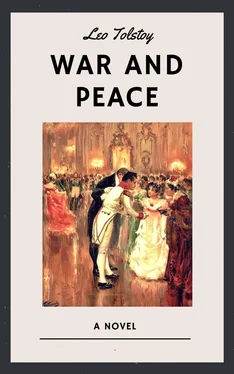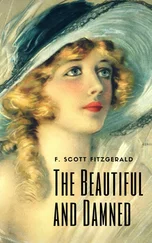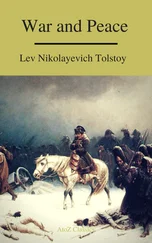“Listen to me, Prince,” said she. “I have never yet asked you for anything and I never will again, nor have I ever reminded you of my father’s friendship for you; but now I entreat you for God’s sake to do this for my son—and I shall always regard you as a benefactor,” she added hurriedly. “No, don’t be angry, but promise! I have asked Golítsyn and he has refused. Be the kindhearted man you always were,” she said, trying to smile though tears were in her eyes.
“Papa, we shall be late,” said Princess Hélène, turning her beautiful head and looking over her classically molded shoulder as she stood waiting by the door.
Influence in society, however, is a capital which has to be economized if it is to last. Prince Vasíli knew this, and having once realized that if he asked on behalf of all who begged of him, he would soon be unable to ask for himself, he became chary of using his influence. But in Princess Drubetskáya’s case he felt, after her second appeal, something like qualms of conscience. She had reminded him of what was quite true; he had been indebted to her father for the first steps in his career. Moreover, he could see by her manners that she was one of those women—mostly mothers—who, having once made up their minds, will not rest until they have gained their end, and are prepared if necessary to go on insisting day after day and hour after hour, and even to make scenes. This last consideration moved him.
“My dear Anna Mikháylovna,” said he with his usual familiarity and weariness of tone, “it is almost impossible for me to do what you ask; but to prove my devotion to you and how I respect your father’s memory, I will do the impossible—your son shall be transferred to the Guards. Here is my hand on it. Are you satisfied?”
“My dear benefactor! This is what I expected from you—I knew your kindness!” He turned to go.
“Wait—just a word! When he has been transferred to the Guards...” she faltered. “You are on good terms with Michael Ilariónovich Kutúzov ... recommend Borís to him as adjutant! Then I shall be at rest, and then...”
Prince Vasíli smiled.
“No, I won’t promise that. You don’t know how Kutúzov is pestered since his appointment as Commander in Chief. He told me himself that all the Moscow ladies have conspired to give him all their sons as adjutants.”
“No, but do promise! I won’t let you go! My dear benefactor...”
“Papa,” said his beautiful daughter in the same tone as before, “we shall be late.”
“Well, au revoir! Good-by! You hear her?”
“Then tomorrow you will speak to the Emperor?”
“Certainly; but about Kutúzov, I don’t promise.”
“Do promise, do promise, Vasíli!” cried Anna Mikháylovna as he went, with the smile of a coquettish girl, which at one time probably came naturally to her, but was now very ill-suited to her careworn face.
Apparently she had forgotten her age and by force of habit employed all the old feminine arts. But as soon as the prince had gone her face resumed its former cold, artificial expression. She returned to the group where the vicomte was still talking, and again pretended to listen, while waiting till it would be time to leave. Her task was accomplished.
“And what do you think of this latest comedy, the coronation at Milan?” asked Anna Pávlovna, “and of the comedy of the people of Genoa and Lucca laying their petitions before Monsieur Buonaparte, and Monsieur Buonaparte sitting on a throne and granting the petitions of the nations? Adorable! It is enough to make one’s head whirl! It is as if the whole world had gone crazy.”
Prince Andrew looked Anna Pávlovna straight in the face with a sarcastic smile.
“‘Dieu me la donne, gare à qui la touche!’’ * They say he was very fine when he said that,” he remarked, repeating the words in Italian: “‘Dio mi l’ha dato. Guai a chi la tocchi!’’
* God has given it to me, let him who touches it beware!
“I hope this will prove the last drop that will make the glass run over,” Anna Pávlovna continued. “The sovereigns will not be able to endure this man who is a menace to everything.”
“The sovereigns? I do not speak of Russia,” said the vicomte, polite but hopeless: “The sovereigns, madame... What have they done for Louis XVII, for the Queen, or for Madame Elizabeth? Nothing!” and he became more animated. “And believe me, they are reaping the reward of their betrayal of the Bourbon cause. The sovereigns! Why, they are sending ambassadors to compliment the usurper.”
And sighing disdainfully, he again changed his position.
Prince Hippolyte, who had been gazing at the vicomte for some time through his lorgnette, suddenly turned completely round toward the little princess, and having asked for a needle began tracing the Condé coat of arms on the table. He explained this to her with as much gravity as if she had asked him to do it.
“Bâton de gueules, engrêlé de gueules d’azur—maison Condé,” said he.
The princess listened, smiling.
“If Buonaparte remains on the throne of France a year longer,” the vicomte continued, with the air of a man who, in a matter with which he is better acquainted than anyone else, does not listen to others but follows the current of his own thoughts, “things will have gone too far. By intrigues, violence, exile, and executions, French society—I mean good French society—will have been forever destroyed, and then....”
He shrugged his shoulders and spread out his hands. Pierre wished to make a remark, for the conversation interested him, but Anna Pávlovna, who had him under observation, interrupted:
“The Emperor Alexander,” said she, with the melancholy which always accompanied any reference of hers to the Imperial family, “has declared that he will leave it to the French people themselves to choose their own form of government; and I believe that once free from the usurper, the whole nation will certainly throw itself into the arms of its rightful king,” she concluded, trying to be amiable to the royalist emigrant.
“That is doubtful,” said Prince Andrew. “Monsieur le Vicomte quite rightly supposes that matters have already gone too far. I think it will be difficult to return to the old regime.”
“From what I have heard,” said Pierre, blushing and breaking into the conversation, “almost all the aristocracy has already gone over to Bonaparte’s side.”
“It is the Buonapartists who say that,” replied the vicomte without looking at Pierre. “At the present time it is difficult to know the real state of French public opinion.”
“Bonaparte has said so,” remarked Prince Andrew with a sarcastic smile.
It was evident that he did not like the vicomte and was aiming his remarks at him, though without looking at him.
“‘I showed them the path to glory, but they did not follow it,’” Prince Andrew continued after a short silence, again quoting Napoleon’s words. “‘I opened my antechambers and they crowded in.’ I do not know how far he was justified in saying so.”
“Not in the least,” replied the vicomte. “After the murder of the duc even the most partial ceased to regard him as a hero. If to some people,” he went on, turning to Anna Pávlovna, “he ever was a hero, after the murder of the duc there was one martyr more in heaven and one hero less on earth.”
Before Anna Pávlovna and the others had time to smile their appreciation of the vicomte’s epigram, Pierre again broke into the conversation, and though Anna Pávlovna felt sure he would say something inappropriate, she was unable to stop him.
“The execution of the Duc d’Enghien,” declared Monsieur Pierre, “was a political necessity, and it seems to me that Napoleon showed greatness of soul by not fearing to take on himself the whole responsibility of that deed.”
Читать дальше












